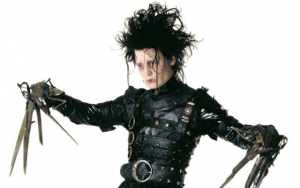Metro In Focus: Tim Burton’s characters, “I feel like they are mutated children.”
 By Richard Crouse – Metro In Focus
By Richard Crouse – Metro In Focus
Visionary Tim Burton values his time alone.
One writer called the director of Pee Wee’s Big Adventure, Beetle Juice, Batman, Edward Scissorhands and this weekend’s Miss Peregrine’s Home For Peculiar Children, “the most widely embraced loner in contemporary cinema.”
“I always try to at least spend time, as much as I can everyday, staring out into space; staring out a window,” the director says. “I find that sometimes you get the most ideas and the most feelings when you’re not involved in things you have to do everyday; especially these days when technology is such that you can be reached any time. I try and avoid that.”
Unsurprisingly as a filmmaker the characters he champions tend to echo his sensibility. From warped Mad Hatter in his Alice in Wonderland to the grieving child in Frankenweenie who reanimated a dog’s corpse, Burton’s heroes are often misfits and outsiders.
From his debut, Pee-Wee’s Big Adventure, Burton has showcased people on the fringes of society. “You don’t wanna get mixed up with a guy like me,” says man-child Pee-Wee (Paul Reubens), “I’m a loner. A rebel.” Loosely based Vittorio De Sica’s classic film The Bicycle Thief, Burton’s story sees Pee-Wee on a mission to retrieve his stolen fire engine-red customized 1940s Schwinn. David Letterman was a fan, describing the anti-social character as having, “the external structure of a bratty little precocious kid, but you know it’s being controlled by the incubus, the manifestation of evil itself.”
In his next film Burton breathed life into Betelgeuse‘s rancid lungs. In the haunted-house comedy Beetlejuice Michael Keaton plays a “bio-exorcist” with crazy hair, giant teeth and an attitude, hired by two ghosts to scare away the insufferable new owners of their old house.
“I think Beetlejuice shows the complete positive side of being misperceived and being categorized as something different,” Burton says. “He can do whatever he wants! He’s horrible and everybody knows it, so he’s a complete fantasy of all of that.”
Burton’s two greatest misfits, his most intrepid folks on the outside looking in, are the off-kilter Eds—Wood and Scissorhands.
Edward Scissorhands is the strange-but-sweet story of a man with scissors for hands. The first collaboration of Tim Burton and Johnny Depp, the movie is a funny, romantic and moving fantasy was inspired by a sketch Burton created as a teenager. “One look at that drawing was all I needed to understand what Edward was about,” says Depp. “I felt very tortured as a teenager,” says Burton. “That’s where Edward Scissorhands came from. I was probably clinically depressed and didn’t know it.”
Ed Wood, played by Depp in the film of the same name, is the story of one of Hollywood’s great outcasts. Wood wrote, produced and directed low-budget anti-classics like Plan 9 from Outer Space and Glen or Glenda. Burton says he was a fan of Wood’s films and after reading some of the director’s letters was touched by how Wood, “wrote about his films as if he was making Citizen Kane, you know, whereas other people perceived them as, like, the worst movies ever.”
Burton links his best-known creations, labelling them as “semi-antisocial, [having] difficulty communicating or relating, slightly out of touch,” and adds, “I feel very close to those characters. I really do. I feel like they are mutated children.”
